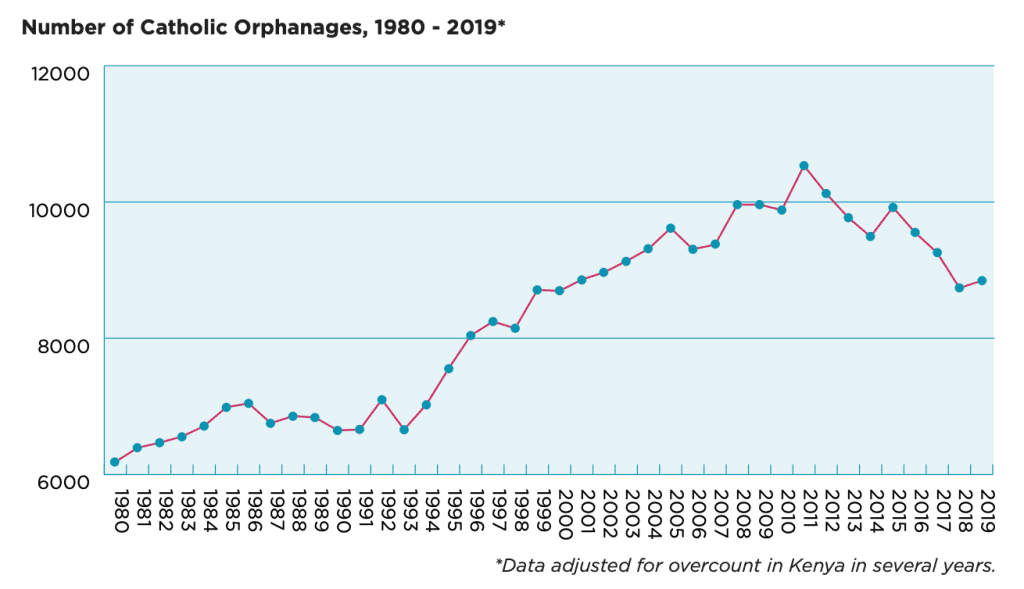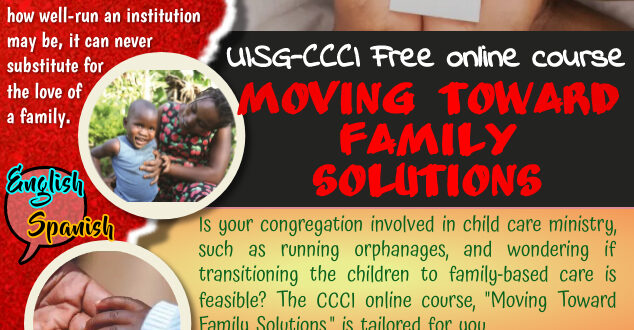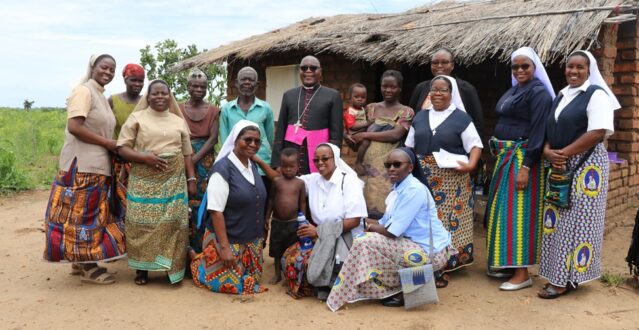The world is waking up to the importance of reforming care of children and vulnerable adults with increasing attentiveness to that which promotes human flourishing. The trend marks a turn away from institutional approaches to care in favor of family- and community-based care.
The decades-long global trend away from institutional care of children and vulnerable adults is fueled by social sciences that clearly demonstrate that growing up in a safe, nurturing family is foundational for healthy psychosocial development across the life span. The social sciences are also clear about the risks associated with institutional care:
- Regardless of circumstances, separation from family is traumatic for a child.
- Outside of family care, a child is more likely to be abused, neglected, or trafficked.
- Young children in residential care, especially those under the age of three, are more susceptible to psychosocial challenges or physical and cognitive delays.
- Incidences of homelessness, crime, and suicide are higher among young people who leave residential care after significant stays.
Informed by the social sciences, emerging legal frameworks are clearly moving toward family and community-based approaches to care of children and vulnerable persons. Most notably, we point to the United Nations Convention on the Rights of the Child (UNCRC), to which the Holy See is a signatory. It clearly asserts the child’s right to a family: “…the child, for the full and harmonious development of his or her personality, should grow up in a family environment, in an atmosphere of happiness, love and understanding….” 1
The sensibilities that inform the UNCRC are echoed by Pope Francis in Amoris Laetitia: “Children, once born, begin to receive, along with nourishment and care, the spiritual gift of knowing with certainty that they are loved. This love is shown to them through the gift of their personal name, the sharing of language, looks of love and the brightness of a smile. In this way, they learn that the beauty of human relationships touches our soul, seeks our freedom, accepts the differences of others, recognizes and respects them as a partner in dialogue… Such is love, and it contains a spark of God’s love.”2
It is clear: it is best for children to grow up in safe, nurturing families. However, upwards of 8 million children are living outside of family care, deprived of the nurture of a safe and loving family. Far too many are living in large institutions. These children are often called “orphans.” Yet this is a misnomer, for about 80% of children in residential care have a living parent. Often it is poverty, disability, a health challenge, or lack of access to basic services that leads to family separation and propels children into residential care, depriving them of the nurture they need and deserve.
Catholic Realities
Among Catholics, care is inspired by the Scriptures and shaped by Catholic social teaching. There are many inspiring examples of care provided by Catholics and under Catholic auspices. In fact, the Catholic community is the world’s largest provider of care and social welfare.
One measure of Catholic care, albeit imperfect, is the number of Catholic-sponsored care institutions. We learn from the Annuarium Statisticum Ecclesiae (2019) that there are more than 105,000 Catholic-sponsored social welfare institutions, including “total care” institutions: 9,374 orphanages and 15,429 homes for the elderly, infirmed, and those with disabilities. There are also 10,723 nurseries.
Here we draw attention to the number of Catholic-sponsored orphanages (more aptly called child care institutions). According to the Annuarium Statisticum Ecclesiae, between 1980 and 2011 the number of Catholic-sponsored orphanages grew from 6,185 to 10,524, an increase accelerated as the impacts of HIV/AIDS became more acute. Since 2011, the number has declined by over 1,000. While we do not know what is driving the decline, it is hoped that it signals fewer children in institutional care.

Catholic Care for Children
There are myriad examples of inspiring and exemplary care of children and the vulnerable provided by Catholics and under Catholic auspices. Family strengthening is preventing separation of children from their parents and siblings, while children who have been separated are being reunited with their families. Those with disabilities are supported in families and communities.
In recent years, congregations of religious women and men have come together to advance care reform in a more concerted and collaborative way. Under the aegis of their respective national conferences of religious, religious women and men in Uganda, Kenya, and Zambia are reading and responding to the signs of the times. They have asked and are answering profound questions:
How shall we express our charisms of care today:
- In light of what the social sciences tell us about the importance of family nurture?
- In light of emerging legal frameworks favoring family car?
- In the light of our faith?
Working together as founding members of the Catholic Care for Children movement, religious women and men in Uganda, Kenya, and Zambia are agents of care reform. They have come together to give expression to their respective charisms of care for children in new ways, transitioning away from institutional approaches for the care of children toward family- and community-based approaches.
Core Beliefs and Principles
In 2020, representatives of Catholic Care for Children developed a charter expressing their core beliefs and principles pertaining to children’s needs and rights to safe, nurturing families.
- If families are in distress, provide support to prevent separation of children from their families.
- If separation occurs, see that children are reunited with families or placed in a family-like environment.
- If emergency care is necessary, ensure that the care is of the highest quality and shortest duration possible.
- Large-scale residential care should always be a last resort.
Promising results have already been realized. With growing resolve, Sisters and their colleagues are working together to reform care. They have built their own capacity for family- and community-based approaches to care through skill-building and training in social work. They have worked closely with local and national officials to ensure compliance with legal frameworks. They have advocated for family care in local communities and in national forums. The number of children in Catholic-sponsored institutions has decreased; more children are in families. Indeed, as religious are finding new ways to express a charism of care, they are emerging as champions of care reform in ways that are improving outcomes for children and their families.
The Light of the World Nursery was set up by the Religious of the Sacred Heart of Mary on the outskirts of João Pessoa in northeast Brazil. It provides a safe, loving, and nurturing crèche and kindergarten environment for children ages three months to seven years who are often from very poor homes. The Light of the World Nursery works with their parents (many of whom are parenting alone) to help them toward creating more stable homes.
In the city of Kisumu, on the shores of Lake Victoria in Kenya, the Franciscan Missionaries of Saint Joseph work with children who live on the streets of the city due to difficult home conditions. The Franciscan Missionaries provide temporary accommodation, counseling, and support on the pathway to reuniting the children with their families. After reconciliation and reintegration, project staff continue to follow up and support the family.
During the COVID-19 lockdown and school closures in the Kannagi-Nagar area of Chennai, India, the Salesian Sisters ensured that over 400 vulnerable children continued to receive education in the evenings, through what would have been after-school classes. Child protection committees set up by the Sisters in the area ensured that no child was forced into labor during the lockdown, despite their parents’ dire financial straits.
In Lusaka, Zambia, the Sisters of the Sacred Hearts of Jesus and Mary set up the only school in the country for children who are deaf and blind. Working to overcome stigma, the project also provides a homebased care service for children, involving parents and the wider community in caring for the children.
Examples courtesy of Misean Cara
1 Preamble to the UN Convention on the Rights of the Child (1989), https://www.ohchr.org/en/instruments-mechanisms/instruments/convention-rights-child.
2 Francis, Post-Synodal Apostolic Exhortation Amoris Laetitia [The Joy of Love], March 19, 2016, no. 172, Holy See, https://www.vatican.va/content/francesco/en/apost_exhortations/documents/papa-francesco_esortazione-ap_20160319_amoris-laetitia.html.
This article is from the publication “A Family for Every Child.” Read the full publication here.








